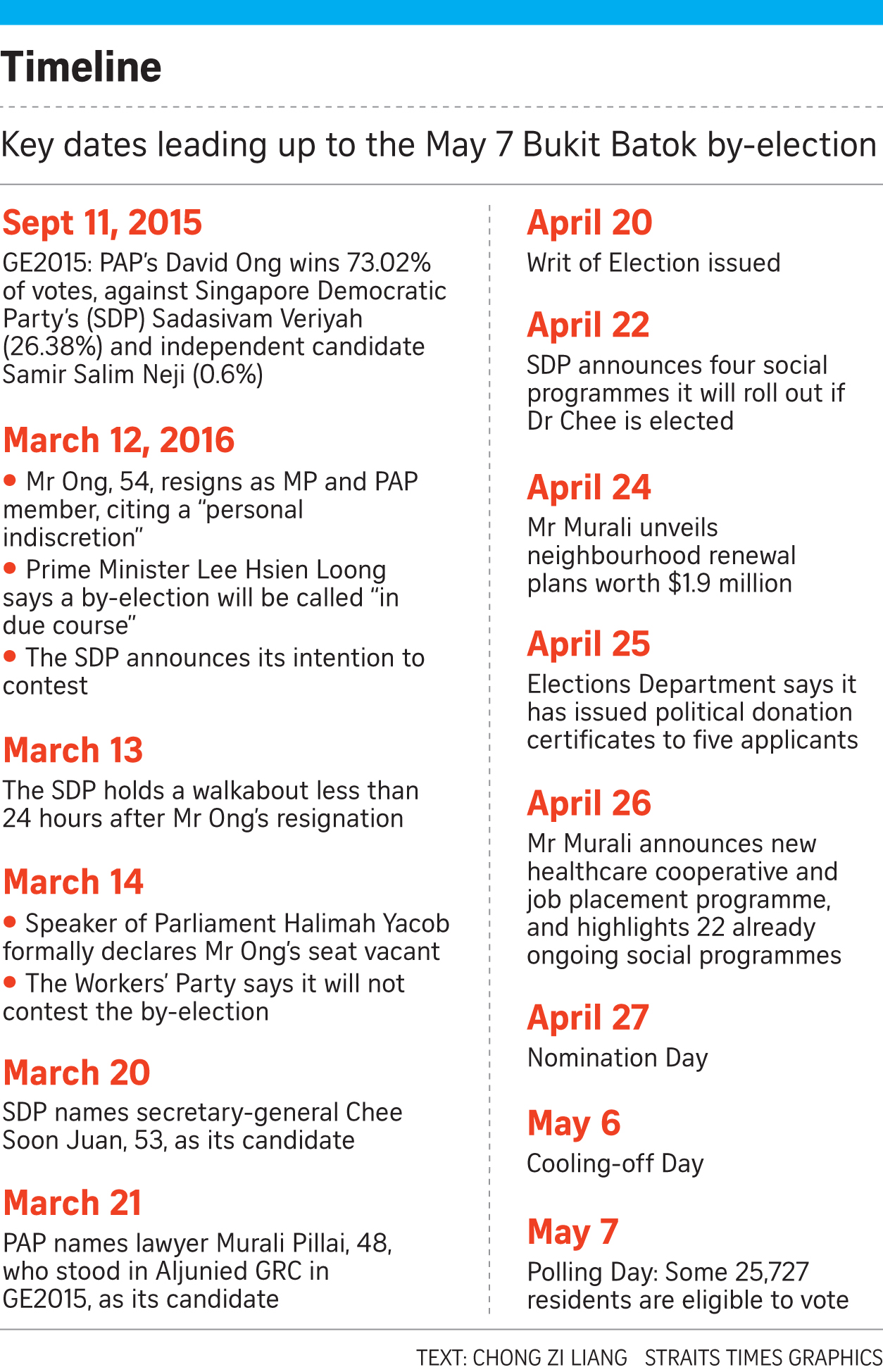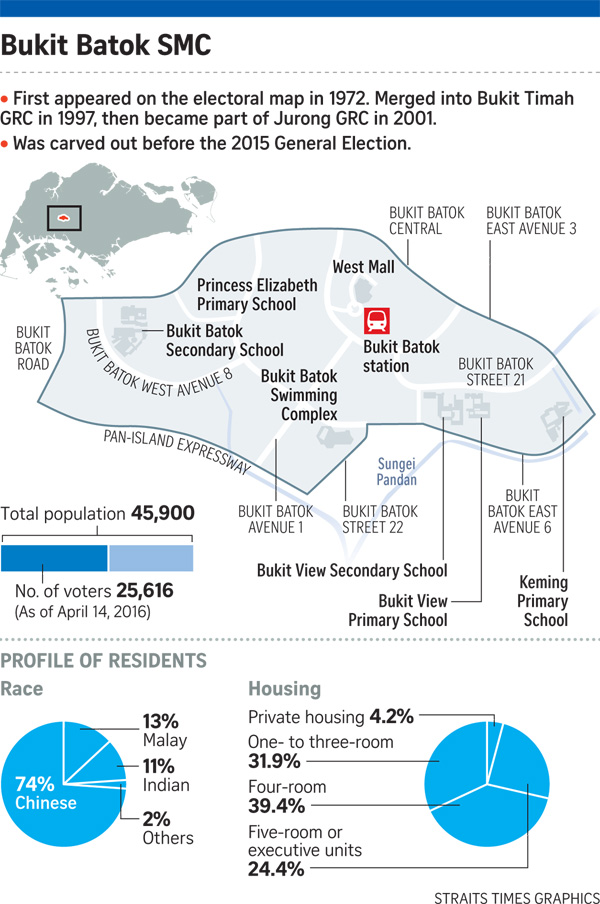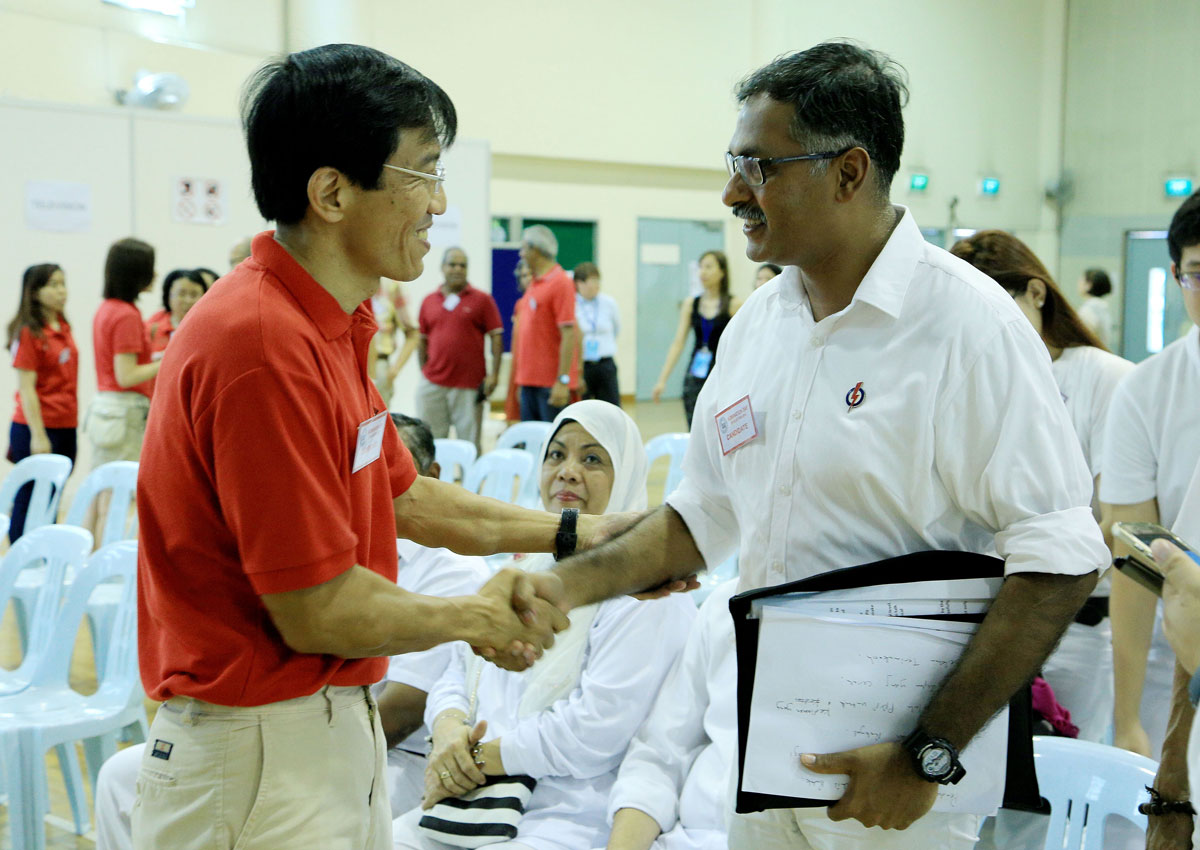Today is Day Five of the nine-day campaign period for the Bukit Batok by-election on May 7.
Battle lines have been drawn in the mature estate in western Singapore, where some 25,727 eligible voters will cast their ballots this Saturday for the second time in only eight months.
The by-election was triggered by the sudden resignation on March 12 of former People’s Action Party (PAP) MP David Ong over a “personal indiscretion”.’
This is Singapore’s third by-election in four years. The last two, in 2012 and 2013, ended with a win for the opposition Workers’ Party.
The PAP goes into the by-election on the back of a nationwide swing at GE2015, the general election last September, where it garnered 69.9 per cent of the vote – 9.8 percentage points more than it secured in GE2011.
It is fielding lawyer Murali Pillai, 48, emphasising his extensive grassroots experience in Bukit Batok of more than 16 years.
Mr Murali’s opponent is Singapore Democratic Party (SDP) chief Chee Soon Juan, a veteran who contested his first election in 1992 – a by-election in Marine Parade.
At GE2015, Mr Ong won 73 per cent of the vote in a three-way contest against the SDP’s Mr Sadasivam Veriyah, who managed 26.4 per cent, and independent candidate Samir Salim Neji , who got just 150 votes and lost his polls deposit.
The task that Dr Chee now faces is to engineera swing of at least 23.7 percentage points.
Will Mr Murali, the first Indian PAP candidate to vie in a single- seat ward in recent elections, prevail? Or will it be Dr Chee, who says he has moved away from the adversarial politics of the past?
How big could the purported “by-election effect” be? How much will election pledges like estate upgrading – which has taken centrestage in this campaign – hold sway over voters? The Sunday Times looks at these issues.
What issues are in play?
PAP: Murali’s advantage is he’s back on familiar ground
The People’s Action Party (PAP) has stressed the long-term grassroots experience of its candidate, lawyer Murali Pillai, in Bukit Batok.
In cards he has distributed to residents, he writes: “It is my privilege to be with you in Bukit Batok, where I’ve served for 16 years.”
National University of Singapore (NUS) political scientist Hussin Mutalib says this works in the PAP’s favour because it would dispel any criticism that Mr Murali has been “parachuted” into the contest.
He was secretary of the Bukit Batok PAP branch for five years, and tended to residents when then MP Ong Chit Chung died in 2008.
Last Sunday, Dr Ong’s widow accompanied Mr Murali on a walkabout.
Although he moved to Aljunied GRC in 2012 and stood as part of the five-man PAP team that narrowly lost to the Workers’ Party (WP) last year, Mr Murali remains a familiar face in the area, has a good relationship with party activists and grassroots leaders, and can hit the ground running, should he be elected.
One measure of how he and the party are demonstrating those continuing and close ties is his election posters. Many show him with residents – a change from the formal candidate portraits that the PAP had previously used.
The party’s approach of fielding someone who has connections to and is known on the ground contrasts with that in the 2013 by-election in Punggol East.
The PAP had then fielded a political newcomer – colorectal surgeon Koh Poh Koon. He was seen as having been parachuted into an area that was new to him.
That disadvantage showed when he lost the seat to the WP’s candidate, Ms Lee Li Lian, who had contested in the 2011 general election and was making her second bid in Punggol East in the 2013 by-election.
Also central to the PAP’s campaign this time has been its track record in town council management and the upgrading and other work that has been put in place.
National University of Singapore (NUS) sociologist Tan Ern Ser notes that the party has highlighted “its long, capable, reliable stewardship of the constituency and town council management and the specifics it has delivered to residents”.
The prospect of continuity of programmes and projects is important to Bukit Batok residents such as student Cheng Ching Yi, 24, and housewife Jessie Toh, 59.
Mr Cheng, a Bukit Batok resident for 13 years, remarks that the estate has been clean and the facilities well maintained.
Bukit Batok was part of Jurong GRC from 2001 until it was carved out as a single-seat ward in last year’s elections.
The estate came under the Jurong Town Council, and now continues to be under the reconstituted Jurong-Clementi Town Council.
That means Bukit Batok enjoys the benefits of economies of scale and the support of its large neighbour, plus the experience of its MPs, including Deputy Prime Minister Tharman Shanmugaratnam, who anchors Jurong GRC.
Mr Tharman, who is popular with residents, has stumped for Mr Murali on several occasions during the campaign, including at the Keming Primary School nomination centre last Wednesday, and a media conference where Mr Murali unveiled his campaign manifesto.
Says NUS political scientist Bilveer Singh: “Bukit Batok is a PAP stronghold benefiting from the osmosis of Jurong GRC and charismatic personality of Mr Tharman.”
He believes Mr Murali’s position as an “old hand” from Bukit Batok, and Mr Tharman’s support, will give the PAP a lift.
Still, what will be watched is how effective such factors will be in enabling the PAP to break the hoodoo of recent by-elections. It lost in 2012 in Hougang and in 2013 in Punggol East to the WP.
Another unknown this time is whether, or to what extent, the race factor will have an effect.
PAP leaders have recognised that race is a factor in politics but are comfortable in their choice of Mr Murali as the candidate.
Mr Murali is the first Indian PAP candidate in recent elections to vie in a single-seat ward that has a higher proportion of Chinese residents than the national average.
He says Chinese-speaking seniors address him as “Ah Mu” and that the question of reaching out to Singaporeans who do not speak English “is not a new one for me”.
It was a reference to the fact that he managed similar demographics in the Paya Lebar ward of Aljunied GRC in GE2015.
Institute of Policy Studies deputy director for research Gillian Koh says: “If the PAP retains the seat, it will suggest that it isn’t always the case that it will lose a seat in a by-election and also that a minority candidate can do the job if he has a proven track record.”

SDP: Chee faces test of his political makeover
Singapore Democratic Party (SDP) chief Chee Soon Juan, 53, has made four unsuccessful bids to enter Parliament since going into politics in 1992.
Eight months ago in GE2015, his four-man team in Holland-Bukit Timah GRC polled 33.4 per cent, a result he described as “dismal”.
It was slightly higher than the 30.1 per cent of eligible Singaporeans who voted against the ruling People’s Action Party (PAP) nationwide.
Come May 7, Dr Chee will be making another attempt at getting elected.
His stump speeches at last year’s general election drew crowds. Also notable at the hustings was his shift away from his adversarial style of politics of the past, which included a hunger strike in 1993 and heckling former prime minister Goh Chok Tong at a hawker centre before GE2001.
Last year, Dr Chee pledged instead to find common ground and work with the PAP. And so, this by-election becomes the latest test – after GE2015 – of how accepting voters are of his makeover and che- quered political past, observers say.
If he does not succeed in his bid, political watchers suggest that anything less than a 40 per cent vote share will constitute a poor result, especially with the “by-election effect” in play to some extent.
Former Nominated MP Eugene Tan says: “The interesting thing is to see how voters will respond to his outreach and his new image.
“If Dr Chee is unable to secure a good score, it shows he still has quite some way to go. The question, then, is whether he will ever shake off his previous image.”
UniSIM College senior lecturer Walter Theseira says Dr Chee has stronger name recognition compared with his opponent, lawyer Murali Pillai, 48 – a “relatively new PAP face” who entered the public limelight on account of his first electoral contest in Aljunied GRC last year. So it is a golden opportunity for Dr Chee to show he can “translate his name recognition and personality into votes”.
“If Dr Chee polls in the low 30 per cent range, it will not be a good performance for an opposition party leader in such a one-on-one fight.”
National University of Singapore (NUS) political scientist Bilveer Singh’s assessment is harsher. He thinks a loss could “tarnish Dr Chee’s political image and may even open up doors for a potential power struggle within the SDP”.
The impact of Dr Chee’s past could cut both ways.
While there might still be some distrust, Dr Singh’s NUS colleague Hussin Mutalib says there may also be “voter sympathy for his long and arduous struggle – they may wish to give him a chance”.
Dr Chee had to sit out two general elections when he was made a bankrupt after a defamation suit brought by Mr Goh and the late founding prime minister Lee Kuan Yew over remarks he made during GE2001. He was discharged in 2012 after both men accepted his offer of settlement.
Still, Institute of Policy Studies deputy director for research Gillian Koh says the nine days of hustings “can throw up different things, which means the SDP camp has to be careful to remain electable in the eyes of the residents”.
Some Bukit Batok residents, like polytechnic student Toby Chua, 24, said they found Dr Chee’s campaign slogan “Now Is The Time” and online presence appealing.
The SDP has outlined a series of alternative policies. Some, like freedom of speech, struck a chord with lecturer Judy Tham, who is in her 40s. She says: “Dr Chee has proven himself to be someone with a level of intellect who can speak for us, and he is someone who means what he says.”
Given the high-profile lapses in governance and accounting practices that dogged the Workers’ Party-run town council, it is telling that the SDP has moved to assuage residents’ concerns about its abilities by forming a panel to help oversee handover matters in the first 100 days, should Dr Chee win.
Says Dr Norshahril Saat of the Iseas-Yusof Ishak Institute: “They (SDP) understand the need to ensure they do not repeat the mistakes of the opposition party in Parliament, and want to convince voters they can run the town council.”
Still, Dr Singh says Dr Chee’s message in the by-election continues a familiar narrative: that he will be a more effective voice than his PAP rival – who Dr Chee says will echo the party line.
It is not a line that will sway Bukit Batok residents, adds Dr Singh, because if Dr Chee is elected, he will be one man up against the ruling party machinery.
Dr Koh and Dr Theseira argue that last year’s weaker performance by the opposition does not signify a waning in the voters’ desire for more political plurality in Parliament.
Says Dr Theseira: “The question is whether they want those voices to come from the SDP and Dr Chee in particular. This by-election is a test of that proposition.”

Additional reporting by Ng Keng Gene and Samuel Mak
waltsim@sph.com.sg
leepearl@sph.com.sg

This article was first published on May 1, 2016.
Get a copy of The Straits Times or go to straitstimes.com for more stories.





















